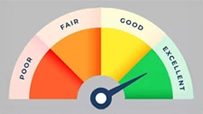What is a Home Loan Top-Up?
Disclaimer: This blog is generic in nature. To know about Ujjivan SFB Pre-Qualified Top Up Home Loan, please click 'Apply Now'.
September 02, 2025

If you’re repaying a home loan and need additional funds for purposes like home renovation or upgrading your property, a home loan top-up could be the ideal solution. It offers the flexibility to borrow additional money on top of your existing home loan, with numerous benefits that make it a convenient and cost-effective option.
Top-up loans are usually offered by banks and financial institutions to customers who have a good repayment history and a positive credit score. The interest rates for top-up loans are generally lower than those of personal loans, making them an attractive option for borrowers in need of funds.
In this blog, we will explore how home loan top-up works and its benefits.
Key Benefits of a Home Loan Top-Up
1. Lower Interest Rates
Being a secured loan, a home loan top-up typically comes with lower interest rates compared to unsecured loans like personal loans. This translates to significant savings on interest payments over time.
2. Effortless Process
The process of applying for a home loan top-up is simpler than applying for a new loan. Since the lender already has your details from your existing home loan, there’s no need to submit additional documentation or provide new collateral.
3. Fast Processing and Quick Disbursal
With most of your details already available with the lender, the approval and disbursal process for a home loan top-up is faster compared to other types of loans. This ensures you get access to funds without unnecessary delays.
4. Flexibility in Usage
Unlike home loans, top-up loans can be used for non-property-related expenses, meaning you can use the funds to meet any financial requirement.
5. Extended Repayment Tenures
You can enjoy a longer repayment tenure compared to personal loans.
Tax Benefits of a Home Loan Top-Up
A significant advantage of a home loan top-up is the tax benefits available, provided the loan amount is used for specific purposes such as home improvement or renovation. In such cases, you will be eligible for tax deduction on interest payment under Section 24(b) of the Income Tax Act. Let’s delve into the details:
1. Deduction Under Section 24
- Self-Occupied Property: For self-occupied properties, you can claim a tax deduction of up to ₹30,000 on the interest paid for the top-up loan. This deduction is part of the overall limit of ₹2 lakh available under Section 24b of the Income Tax Act for home loan interest.
- Let-Out Property: For let-out properties, the deduction on interest payments is unlimited. However, there is an annual set-off limit of ₹2 lakh against other heads of income. Any interest payment exceeding ₹2 lakh in a financial year can be carried forward for up to eight years.
- Deduction of principal amount for purchase of new property: If you use the top-up loan amount for the purchase or construction of a new property, you will be eligible for tax deduction on the principal repayment – Section 80C and on the interest payment – Section 24(b).
2. Purpose of Loan Usage Matters
Tax benefits are only available if the top-up loan is used for:
- Renovating or repairing an existing house.
- Purchasing a new property.
If the loan amount is used for personal expenses, such as funding a wedding or vacation, these tax benefits will not apply.
Eligibility for a Home Loan Top-Up
Most banks allow you to apply for a top-up loan once you’ve completed at least 12 monthly instalments of your home loan. This ensures that you’ve established a repayment track record and are in good standing with your lender.
Things to Consider Before Opting for a Home Loan Top-Up
- Loan Tenure and EMI: Assess whether the additional EMI fits into your budget without straining your finances.
- Interest Rates: Compare interest rates across lenders to secure the best deal.
- Tax Implications: Understand the tax benefits associated with the purpose of the top-up loan.
- Lender Policies: Check if your lender imposes any restrictions on the usage of top-up loan funds.
- Repayment Capacity: Ensure that you have the financial capacity to repay the additional loan without defaulting.
Final Thoughts
A home loan top-up can be a valuable financial tool for those looking to address unexpected or planned expenses without resorting to high-interest loans. By leveraging your existing home loan, you can secure additional funds at a reasonable cost. However, it is essential to evaluate your financial situation and loan terms carefully before opting for a top-up loan.
Buying a house has never been this easy! Avail Ujjivan SFB’s wide range of affordable home loan products and enjoy a hassle-free loan journey. From house purchase loan to plot loans and home improvement loans, we have it all! Alternatively, you can browse through Ujjivan SFB product suite - our wide range of financial products are designed to make your financial life better.
Disclaimer:
The contents herein are only for informational purposes and generic in nature. The content does not amount to an offer, invitation or solicitation of any kind to buy or sell, and are not intended to create any legal rights or obligations. This information is subject to updation, completion, amendment and verification without notice. The contents herein are also subject to other product-specific terms and conditions, as well as any applicable third-party terms and conditions, for which Ujjivan Small Finance Bank assumes no responsibility or liability.
Nothing contained herein is intended to constitute financial, investment, legal, tax, or any other professional advice or opinion. Please obtain professional advice before making investment or any other decisions. Any investment decisions that may be made by the you shall be at your own sole discretion, independent analysis and evaluation of the risks involved. The use of any information set out in this document is entirely at the user’s own risk. Ujjivan Small Finance Bank Limited makes no representation or warranty, express or implied, as to the accuracy and completeness for any information herein. The Bank disclaims any and all liability for any loss or damage (direct, indirect, consequential, or otherwise) incurred by you due to use of or due to investment, product application decisions made by you on the basis of the contents herein. While the information is prepared in good faith from sources deemed reliable (including public sources), the Bank disclaims any liability with respect to accuracy of information or any error or omission or any loss or damage incurred by anyone in reliance on the contents herein, in any manner whatsoever.
To know more about Ujjivan Small Finance Bank Products Visit:"https://www.ujjivansfb.in"
All intellectual property rights, including copyrights, trademarks, and other proprietary rights, pertaining to the content and materials displayed herein, belong
to Ujjivan Small Finance Bank Limited or its licensors. Unauthorised use or misuse of any intellectual property, or other content displayed herein is strictly prohibited and the same is not intended for distribution to, or use by, any person in any jurisdiction where such distribution or use would (by reason of that person’s nationality, residence or otherwise) be contrary to law or registration or would subject Ujjivan Small Finance Bank Limited or its affiliates to any licensing or registration requirements.
FAQs
1. What is the eligibility for a home loan top-up?
Eligibility depends on your repayment history, the outstanding balance of your existing home loan, and the market value of the property. Consult your lender for specific criteria.
2. Can I use a top-up loan for any purpose?
Yes, top-up loans offer flexibility and can be used for various needs like education, medical expenses, travel, or home improvement. However, some lenders may impose restrictions.
3. Are there tax benefits on home loan top-ups?
Yes, if the loan is used for home renovation or construction, you may claim tax benefits under Section 24(b) of the Income Tax Act. Other uses may not qualify.
4. How is the interest rate for a top-up loan determined?
The interest rate for a top-up loan is usually marginally higher than the original home loan rate but significantly lower than personal loan rates.
5. What documents are required for a top-up loan?
Typically, you need to provide identity proof, income proof, property-related documents, and the existing home loan account statement.
6. Can I transfer my home loan and top-up loan to another lender?
Yes, many banks allow you to transfer your existing home loan along with the top-up loan to benefit from better interest rates or terms.
7. How does the loan tenure for a top-up loan work?
The tenure usually aligns with the remaining period of the original home loan but may vary depending on the bank’s policies.
8. What is the maximum amount I can borrow as a top-up loan?
The maximum amount depends on factors like your repayment capacity, outstanding home loan balance, and the property’s current market value.
9. Is a credit score important for a top-up loan?
Yes, a good credit score demonstrates financial discipline and increases the likelihood of your loan application being approved.
10. Are there any processing fees for a top-up loan?
Most banks charge a processing fee for a top-up loan, which can vary between 0.5% and 2% of the loan amount. Check with your bank for exact charges.
Latest Blogs

Gold Loan LTV Ratio Explained (75% to 85%): What It Means for Borrowers
March 20, 2025
In June 2025, the Reserve Bank of India (RBI) introduced a significant relaxation for gold loan borrowers: the maximum Loan-to-Value (LTV) ratio for loans below ₹2.5 lakh was raised to 85%, up from the long-standing cap of 75%. Loans between ₹2.5 lakh and ₹5 lakh can now go up to 80%, while loans above ₹5 lakh continue under the 75% ceiling.

Good Debt vs Bad Debt: Learn the Difference
August 13, 2025
Every month, millions of Indians wait for the familiar debit alert, an EMI deducted from their account.

Got a Tax Refund? 5 Smart Ways to Put Your 2025 Refund to Work
August 13, 2025
For many taxpayers, there’s a unique sense of relief when a tax refund arrives.

Credit Score Not Improving? 5 Mistakes You Might Be Making
August 13, 2025
For most of us, a credit score feels like a silent judge sitting in the background of our financial lives.

Banking Jargon Decoded: 15 Key Terms You Should Know
May 13, 2025
Banking feels simple on the surface; deposit money, withdraw when needed, pay bills, or transfer funds.




